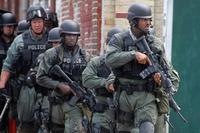-
Second suspect eludes dragnet as Boston remains locked down
The second suspect in the Boston Marathon bombing, 19-year old Dzokhar Tsarnaev, has so far managed to elude a massive dragnet, which began shortly after midnight. The streets of Boston and many of its suburbs remain empty, as residents were told to stay home, schools and businesses were closed, and public transportation and taxis were not in operation.
-
-
One bomber killed, Boston area under lock down as hunt for second bomber continues
Boston police earlier this morning shot and killed one of the suspects in Monday’s Boston Marathon bombing. The shooting took place in Watertown, a suburb of Boston. The police says that suspect no. 1 – the one seen wearing a dark baseball cap in the images the FBI releases Thursday afternoon – was apparently killed by an explosive device he was carrying on him or with him. The explosives went off after an exchange of heavy fire with the police.
-
-
FBI releases images of bombing suspects
The FBI yesterday released videos and photographs of two young men, saying both are suspects in the Boston Marathon bombings. The agency warned that the two suspects should be regarded as armed and dangerous. The FBI was also analyzing cellphone tower records to identify positive hits for signs of calls which may have been placed to trigger both explosions remotely. Investigators are also interested in a battery believed to be used in one of the bombs. The battery was likely purchased with a remote control toy and then extracted so it could be used in the bomb. That could potentially make it easier to zero in on a suspect.
-
-
DHS cuts funds for programs aiming to prevent a McVeigh-like fertilizer bombing attacks

Timothy McVeigh used two tons of fertilizer and $3,000 of racing fuel to detonate a bomb outside the Alfred Murrah Federal Building in Oklahoma City in 1995. The blast killed 168 people. The Obama administration is currently not allocating money or resources to preventing fertilizer bombing attacks like the one McVeigh used, according to a former DHS official with direct knowledge of the department’s budgeting and operations.
-
-
DHS-funded police gear blurs line between crime-fighting and war-fighting

DHS is funding the purchase of military gear by Bay Area police departments. Critics of the program say the money allocated for the war on terror is blurring the line between local law enforcement focusing on crime fighting and soldiers fighting in an enemy war zone.
-
-
Federal security grants to Kansas City cut
DHS has removed Kansas City from the list of cities receiving DHS grants, which means that the city will now have to rely on its own resources to train local law enforcement on how to predict, spot, and react to terrorist activities.
-
-
Reinvestment in U.S. water infrastructure should be a top national priority
The U.S. water infrastructure is often called the “invisible infrastructure” – a vast, largely invisible network of pipes and tunnels — nearly 1.4 million miles span across the United States, which is eight times the length of the U.S. highway system. Much of the U.S. infrastructure was built more than a century ago, and currently around 10 percent of these systems are at the end of their service life. If not addressed by 2020, this number could rise to 44 percent. A summit meeting of the U.S. water community calls on Congress to make water infrastructure a top national priority.
-
-
Mississippi man arrested for sending ricin letters to Obama, Sen. Wicker
The FBI confirmed yesterday (Wednesday) that a letter addressed to President Obama was found to contain the toxin ricin. As is the case with all the mail sent to the White House, the letter was screened in a remote mail sorting facility in Anacostia, a neighborhood in southeast Washington, D.C., and intercepted. The FBI arrested a man from Tupelo, Mississippi, on suspicion that he was behind the ricin letters to the White House and to Senator Roger Wicker (R-Mississippi), who lives in Tupelo.
-
-
IEDs a growing threat in U.S.: security experts
Improvised explosive devices (IEDs) killed and maimed so many U.S. and coalition soldiers in Iraq and Afghanistan, that the Pentagon was forced to create the Joint Improvised Explosive Device Defeat Organization (JIEDDO).Terrorism experts say that as al Qaeda and its affiliates find it more and more difficult to engage in more spectacular terrorist attacks such as 9/11 and other attacks on aviation, they may resort to low-tech, IED-based attacks.Incendiary IEDs were already the most common weapons used in the 207 terrorist plots and attacks in the United States from 2001 to 2011. Domestic groups, led by the environmental Earth Liberation Front and Animal Liberation Front, were responsible for most of the attacks in that 10-year period. Al Qaeda was involved in four such attacks.
-
-
Ease of construction makes pressure-cooker bombs popular among terrorists

The ease of building pressure-cooker bombs has made them popular among terrorist organizations and insurgent groups. Inspire, the on-line English-language magazine published by Al Qaeda in the Arabian Peninsula (AQAP), three years ago published an article titled “How to Make a Bomb in the Kitchen of Your Mom” by “the AQ Chef,” which contained detailed instructions on building a pressure-cooker bomb.
-
-
White House threatens to veto House cybersecurity bill
The White House on Tuesday threatened to veto the cybersecurity bill drafted by the House of Representatives. The house is expected to vote on the bill later this week. The cybersecurity bill died in the Senate last August after the White House said it would veto the bill.
-
-
DHS formula grants to states drop dramatically
DHS money allocation o money to states for first response and disaster recovery has dropped significantly. DHS formula grant program was at an all-time high of $2 billion in 2003, but last year the program had only $294 million. As a result of the sequester, another 5 percent will be cut from the program.
-
-
Boston bombing may signal end to ten relatively terror-free years in U.S.

The bombing at the Boston Marathon on Monday may signal an end to more than ten years in which the United States was surprisingly free from terrorists attacks, largely as a result of aggressive law enforcement tactics which followed the 9/11 attacks.
-
-
Experts will meet in September for the bi-annual anthrax research conference
More than 300 scientists and researchers from all over the world who work on Bacillus anthracis, the causative agent of anthrax, and B. cereus and B. thuringiensis, two closely related bacilli, will be heading to Victoria, British Columbia for the Bacillus ACT 2013 conference, which will be held 1-5 September.
-
-
Bombs kill 3, injure 130 at Boston marathon (updated)
Two loud explosions near the finish-line of the Boston Marathon killed three people and injured 130 Monday afternoon. The two blasts occurred after about half the runners taking part in the marathon had already crossed the finish line. Thousands of runners were still heading toward the finish line, but race organizers halted the race within minutes after the explosions.
-
More headlines
The long view
Factories First: Winning the Drone War Before It Starts
Wars are won by factories before they are won on the battlefield,Martin C. Feldmann writes, noting that the United States lacks the manufacturing depth for the coming drone age. Rectifying this situation “will take far more than procurement tweaks,” Feldmann writes. “It demands a national-level, wartime-scale industrial mobilization.”
No Nation Is an Island: The Dangers of Modern U.S. Isolationism
The resurgence of isolationist sentiment in American politics is understandable but misguided. While the desire to refocus on domestic renewal is justified, retreating from the world will not bring the security, prosperity, or sovereignty that its proponents promise. On the contrary, it invites instability, diminishes U.S. influence, and erodes the democratic order the U.S. helped forge.
Fragmented by Design: USAID’s Dismantling and the Future of American Foreign Aid
The Trump administration launched an aggressive restructuring of U.S. foreign aid, effectively dismantling the United States Agency for International Development (USAID). The humanitarian and geopolitical fallout of the demise of USAID includes shuttered clinics, destroyed food aid, and China’s growing influence in the global south. This new era of American soft power will determine how, and whether, the U.S. continues to lead in global development.
Water Wars: A Historic Agreement Between Mexico and US Is Ramping Up Border Tension
As climate change drives rising temperatures and changes in rainfall, Mexico and the US are in the middle of a conflict over water, putting an additional strain on their relationship. Partly due to constant droughts, Mexico has struggled to maintain its water deliveries for much of the last 25 years, deliveries to which it is obligated by a 1944 water-sharing agreement between the two countries.
How Disastrous Was the Trump-Putin Meeting?
In Alaska, Trump got played by Putin. Therefore, Steven Pifer writes, the European leaders and Zelensky have to “diplomatically offer suggestions to walk Trump back from a position that he does not appear to understand would be bad for Ukraine, bad for Europe, and bad for American interests. And they have to do so without setting off an explosion that could disrupt U.S.-Ukrainian and U.S.-European relations—all to the delight of Putin and the Kremlin.”
How Male Grievance Fuels Radicalization and Extremist Violence
Social extremism is evolving in reach and form. While traditional racial supremacy ideologies remain, contemporary movements are now often fueled by something more personal and emotionally resonant: male grievance.
